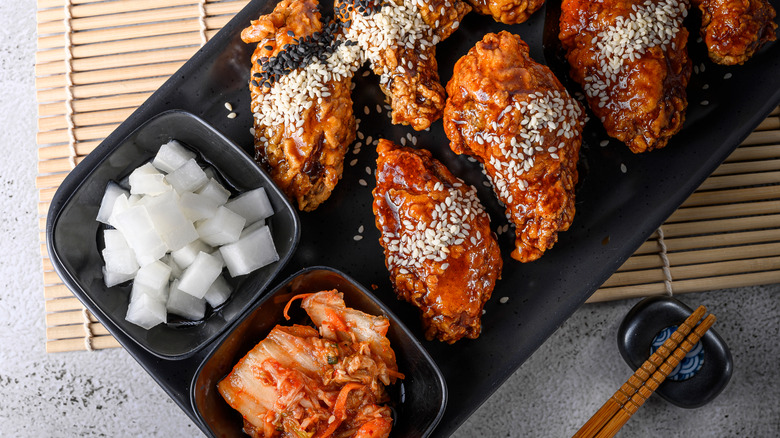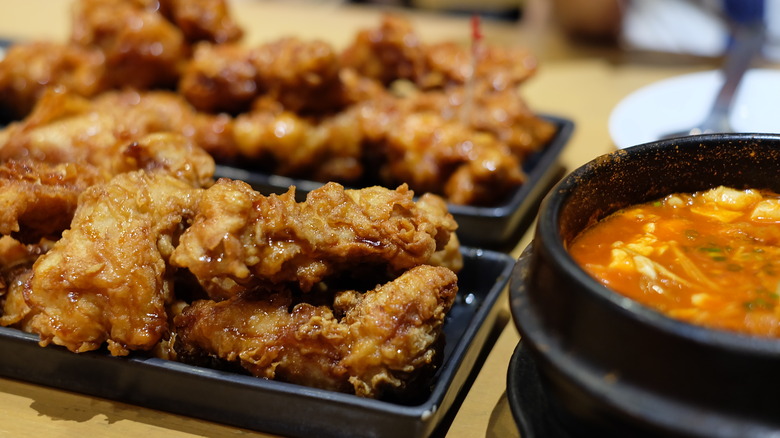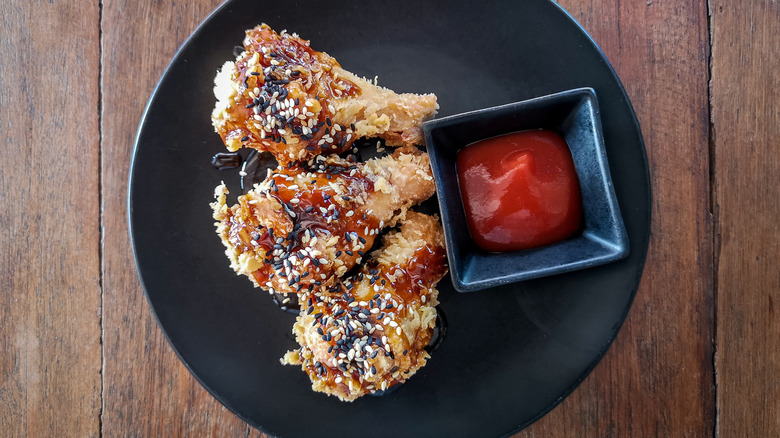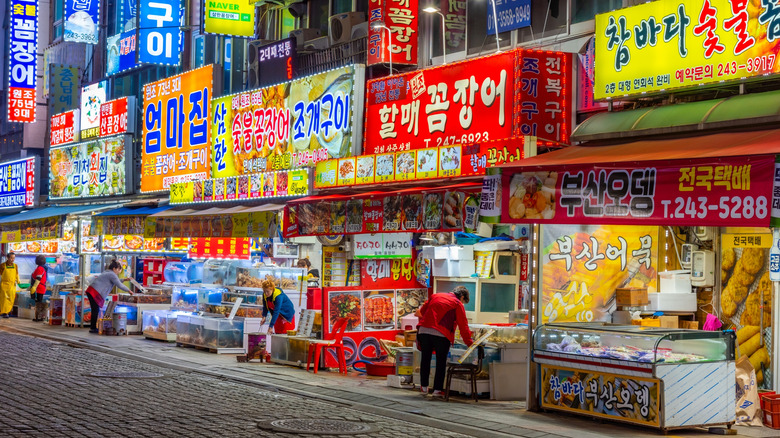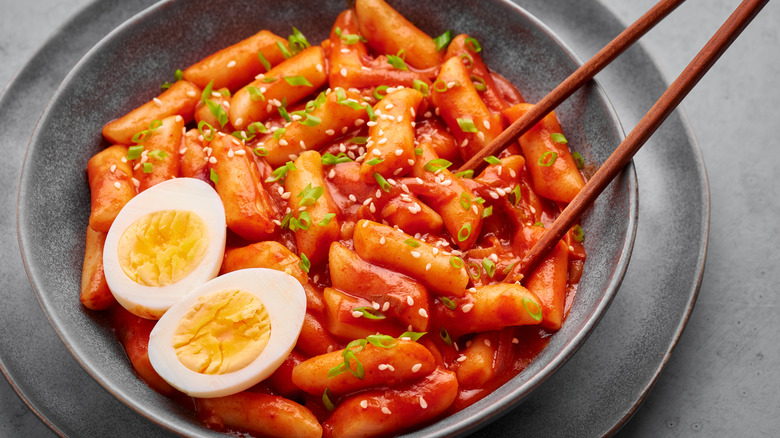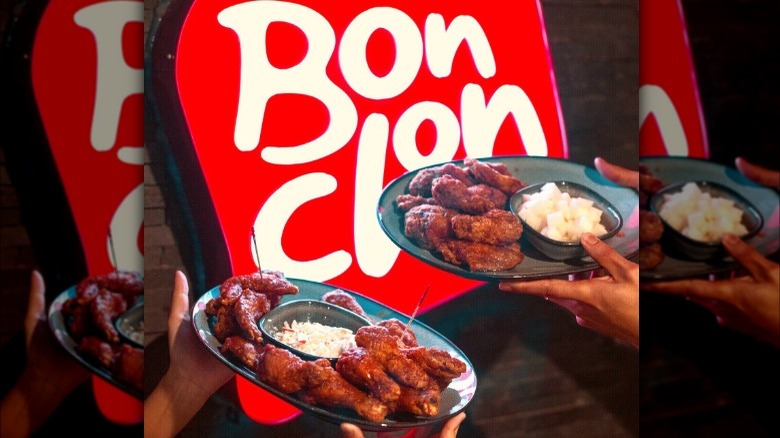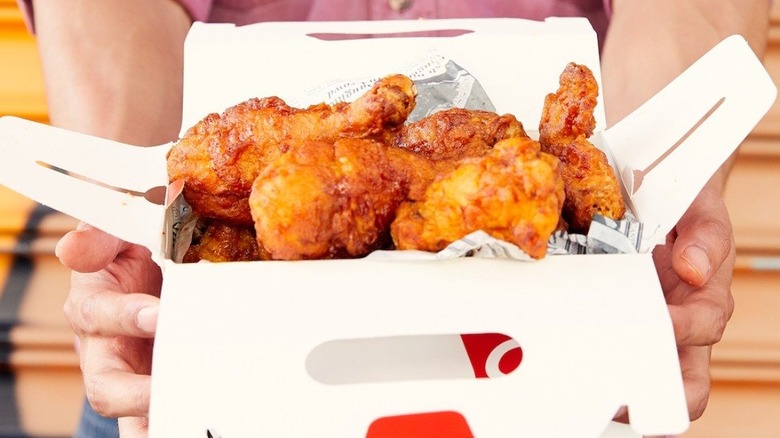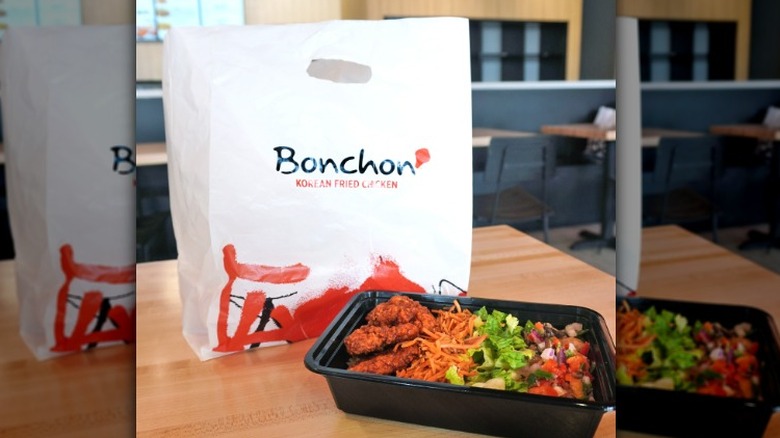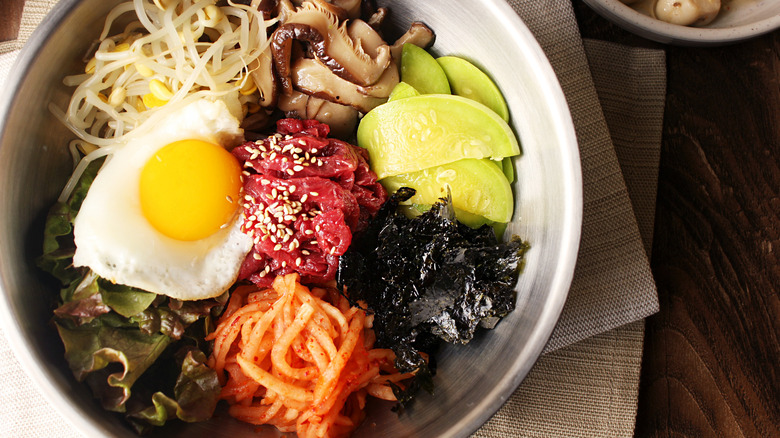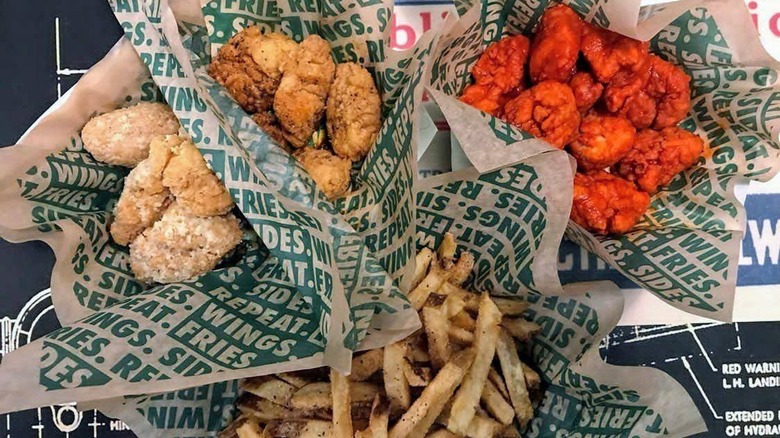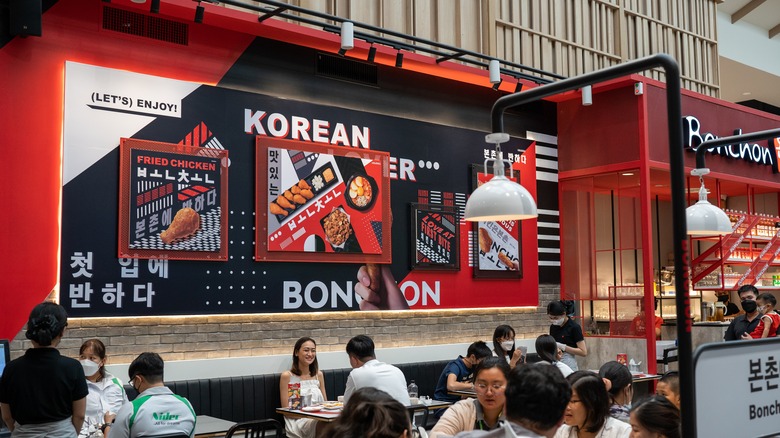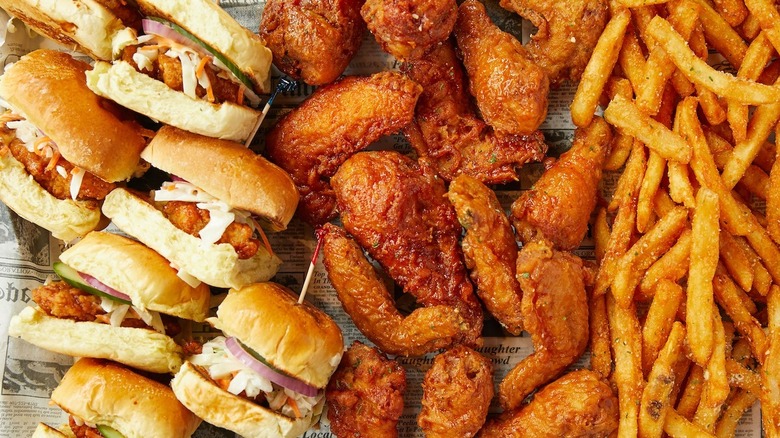Bonchon: 13 Facts About The Korean Fried Chicken Chain
Unless you've been living under a rock for the past couple of years, you've probably noticed the explosive growth in KFC. No, not the KFC with the Colonel and his mustache — Korean fried chicken. Not only are Korea's popular bands and dramas taking over the world — but the light crispiness of its deeply flavored fried chicken is also trending everywhere.
The owner of a Korean fried chicken restaurant in Los Angeles predicted that "Korean fried chicken is going to be something that's a household name and takes over like Nashville fried chicken" (via The Orange County Register). It seems her prophecy is already coming true. With over 87,000 fried chicken restaurants in South Korea alone, Korean people are no strangers to the addictive crunch of their chicken. But one restaurant franchise — Bonchon — has already made huge waves in the United States. Read on for facts about this popular Korean fried chicken brand you probably didn't already know.
1. Bonchon began its story in South Korea, but quickly took over the American market
Bonchon first opened in the oceanside city of Busan in South Korea. The name Bonchon literally translates to "my hometown." Only four years after its inception, the restaurant traveled over the Pacific and introduced its first U.S.-based location in Fort Lee, New Jersey. The hype on opening day was so big, and founder Jinduk Seo said he "knew [he] had a winning formula when the police were dispatched to manage the overwhelming crowd at the first Bonchon restaurant in New Jersey."
Since then, Bonchon experienced explosive growth in the U.S., with more than 100 restaurants across 23 states. It celebrated its first major milestone with its 100th restaurant in Northern California on December 18th, 2019. A couple of years later, the company decided to relocate its global headquarters to Dallas, Texas, in order to build a bigger retail footprint and a foundation for even more growth. Additionally, the franchise also has more than 300 locations internationally, such as in Vietnam, Thailand, and Singapore.
2. Bonchon wasn't originally going to make chicken — it was about the sauce
Although Bonchon is quickly becoming one of the worldwide figureheads of Korean fried chicken, founder Jinduk Seo wasn't actually as interested in the chicken aspect. He started the business to sell the sauces that eventually became the signature offerings of the restaurant. CEO Flynn Dekker told Foodable, "He was really into sort of the laboratory of making great sauces."
Back then, Seo had suppliers but decided to cut out the middleman and produce the sauces on his own. As evidenced by his worldwide success, he made the right decision. To this day, Bonchon still follows Seo's same procedure from 2002 when it comes to creating its sauces. Dekker goes on to say "The philosophy in that process really hasn't changed. The cooking process is the same. We make our own sauces and we still baste the chicken the same way. So the care in the kitchen and the culinary expertise, none of that has changed."
3. Bonchon double fries its chicken
If you've ever had Korean fried chicken, you probably noticed it has an incredible crunchiness and crispiness that permeates the wing, while somehow still being light and delicate. This is because Korean fried chicken is fried twice. Although Bonchon and other Korean fried chicken joints didn't invent double-frying, they certainly popularized the technique.
To get that addictive crunch, restaurants fry the chicken until the skin starts to crisp up and then remove it from the hot oil to let the meat rest. It's then returned to oil at an even higher temperature to finish cooking. The reason why this makes the chicken even crispier lies in the science of the food.
The crispy skin we love oh so much is comprised mostly of fat and water. When the chicken is lowered into hot oil, the moisture begins to evaporate. To get that super-crispy texture, the water needs to be fully evaporated. However, the amount of time required to remove the moisture would leave the chicken completely overcooked. Double-frying helps eliminate moisture by letting the chicken rest in between the frying process.
Nowadays, pretty much every Korean fried chicken joint employs this process. Bonchon hand-breads every piece of chicken, then double-fries it to crispy perfection. This allows the skin to stay super crispy even when it gets doused in one of the delicious sauces.
4. Bonchon brings in its proprietary sauce all the way from Korea
Bonchon's signature sauces set it apart from other fried chicken chains. Ever since Jinduk Seo first began creating the sauces himself, pretty much nothing has changed — even the fact that all of the sauces are made in Busan. The secret sauces are then shipped around the world and hand-brushed into the nooks and crannies of the delicious fried chicken.
Since Bonchon's inception, it has stuck with two classic sauces: soy garlic and spicy. The masterminds at the restaurant worked tirelessly to find the perfect balance of flavors, and it shows. For nearly 17 years, Bonchon skyrocketed to fame with nothing more than the two original sauces Jinduk Seo created. But in 2019, Bonchon finally introduced a new flavor to its menu. The third flavor, aptly named sweet crunch, was created for people who like a bit of sweetness with their fried chicken.
People don't just go crazy for the sauces that coat the chicken; they have also lined up for the brand's limited edition cucumber wasabi ranch dipping sauce. It's so popular, Bonchon decided to bring it back on National Chicken Wing Day on July 29, 2021. The creamy, light, and refreshing kick pairs perfectly with the rich crunch of Bonchon's soy garlic and spicy wings. Which begs the question — why is it only available for a limited time?
5. Bonchon serves other signature Korean dishes as well
Although Bonchon specializes in "chi-maek" (which translates to "chicken and beer" in Korean), it just wouldn't be right if the chain didn't offer other signature dishes from South Korea on its menu.
One Korean favorite it features is bulgogi (which translates to "fire meat"), which is thinly sliced ribeye marinated for hours and sautéed with onions, scallions, mushrooms, and more. Bonchon also serves japchae, a glass noodle dish with bulgogi and a variety of vegetables, like carrots, red peppers, onions, mushrooms, and spinach. Another Korean street food favorite is tteokbokki, which are rice cakes cooked in a creamy, spicy sauce and served with fish cakes, veggies, and cheese. You can also opt for a healthier option like bibimbap, which is a traditional rice and veggie bowl with a fried egg on top.
If you're not craving Bonchon's fried chicken, it serves other Korean variations of the bird as well, including chicken katsu (a breaded chicken cutlet topped with katsu sauce and spicy mayo) or buldak (a spicy dish with rice cakes and veggies). Bonchon also has several Asian appetizers to complement the wings, including potstickers, shrimp shumai, and takoyaki (a Japanese street food favorite). Additionally, you can try Bonchon's Korean-American fusion-style dishes, like sliders, pork buns, and even Korean tacos.
6. There are more Bonchons in the US than in South Korea
Perhaps surprisingly, Bonchon has far more locations in the United States than it does in its homeland of South Korea. The chain boasts a whopping 115 locations in the U.S. and only 10 locations in Korea. That number won't stay the same for long though. According to QSR Magazine, Bonchon has been firing on all cylinders and has registered a 15% same-store sales increase in 2021. There are already 120 more commitments for upcoming stores in the United States alone.
Outside of the U.S. and Korea, Bonchon has locations in Australia, Cambodia, France, Myanmar, the Philippines, Singapore, Thailand, and Vietnam. It's clear Bonchon is on a mission to become Korea's fried chicken ambassador to the world. CEO Flynn Dekker told Foodable that although Bonchon is pushing to expand exponentially in the coming years, the company still wants its franchises to provide top-quality customer service, excellent product quality, and world-class dining experiences.
7. Opening a Bonchon chain costs about a half a million dollars
It's well-known in restaurant circles that Bonchon is pushing hard to expand its brand all over the world. Its representatives have been interviewed by several major outlets to comment on the 35% revenue spike and the restaurant's general success around the world. Forbes interviewed marketing associate Victor Chang, who noted that expanding the number of locations is one way to promote the brand's recognition. In the future, Bonchon is hoping to have 400 stores in the U.S. alone, bringing it up to 700 stores worldwide.
With such rapid growth and impressive numbers, opening a Bonchon franchise can be a tempting option for people looking to invest. But how much does it cost? According to Top Franchise, you'll need a starting investment of around $500,000 and up to $1 million. Bonchon also has a franchise fee of up to $40,000.
Besides the investment, which includes equipment, signage, licenses and permits, uniforms, insurance, and more, it's important to find a location that appeals to the target customer base. Bonchon typically caters to middle-to-upper-class millennials. Although it tends to excel on U.S. coasts, the brand is beginning to penetrate deeper into cities like Austin, Minneapolis, and Denver. It might be a lot of money and work — but seeing how much Korean fried chicken is trending, it could be the best investment a person makes.
8. Bonchon is undergoing a big makeover
In 2021, Bonchon announced several big decisions regarding its future trajectory in a press release (via PR Newswire). The first step was moving the headquarters from New York City to Dallas, allowing the business to operate from a more centralized location to better support franchises on both coasts.
But that's not all. Changes in design are meant to build on the momentum the brand has experienced over the past few years, with elements like modern furniture, eye-catching colors, and a bold urban and street art-inspired aesthetic. When a customer first visits Bonchon, they'll see picturesque street murals of Busan, South Korea.
The brand also plans to streamline its menu by focusing on customer favorites and introducing new items that have been rigorously tested at corporate locations as well as the Busan global test kitchen. These enhancements are meant to help the chain bolster its online ordering, which makes up more than half of the business's current revenue.
All of these changes are meant to create "an even stronger foundation for Bonchon's continued national growth," according to CEO Flynn Dekker. Don't be surprised if a new Bonchon pops up in your neighborhood.
9. The brand experienced meteoric growth — even during the pandemic
It's no secret the pandemic was devastating to the restaurant industry. Bonchon, on the other hand, has been one of the rare food-service companies that continued to thrive — even amidst the harsh days of closures. In 2020, during the height of the pandemic, the chain managed to open 15 new restaurants (although the company had originally planned to open an additional five).
Even though the restaurant was caught off guard when shutdowns began due to its lack of drive-thru windows, it quickly pivoted to online ordering combined with carry-out and delivery orders. Before the pandemic, online sales made up less than half of the business, but by the summer of 2020, 94% of the orders were online (via Forbes).
According to Global Franchise, Bonchon experienced a 15% sales increase in 2021 compared to 2020, while still managing to open new locations around the world. The business credits several factors for its success, including tech innovations like a new POS system as well as its partnership with DoorDash, which brought in nearly half of its sales during 2021. Not many businesses were able to weather the storm quite like Bonchon did.
10. Bonchon knows America is trying to be healthier — so it's adapting, too
To survive in today's cutthroat business world, it's important to be able to pivot and evolve as the market changes. Bonchon seems to understand this better than most. There aren't many fried chicken joints that see Americans trying to be healthier and actually shift their business strategy to match customer desires.
Bonchon's corporate chef, Hank Balle, told Forbes that the business is ready to adapt. "We see strong growth in our fried chicken sales, but we're looking to offer more healthier items. For example, we see strong growth in salad items such as salmon salad, tofu crispy chicken, avocado bowl, and udon."
They weren't empty words, either. If you check out Bonchon's menu, you can find plenty of nutritious options, including the sesame ginger salad, kimchi coleslaw, udon noodle soup, bibimbap, and the healthy Bonchon wrap packed with veggies. It's hard to picture other restaurants known for fried chicken that would offer an array of healthy options to their customers.
11. Bonchon's CEO is a chicken wing veteran
In 2019, Jinduk Seo, Bonchon's legendary founder, handed over the reins to Flynn Dekker as chief executive officer. Seo remained a shareholder and a critical member of the company's board but expressed his confidence in Dekker's leadership. Dekker is no beginner to the wing scene, though. He was the chief marketing officer at Wingstop for over four years, arguably the most significant chicken wing franchise in the country.
In his own words, Dekker says he fell in love with Bonchon at first taste. "My passion for Bonchon began many years ago when I discovered the brand on a trip to New York City." Bonchon's commitment to serving a unique, quality product combined with its loyal, worldwide fanbase and talented team are just some of the reasons I am excited to be leading the brand," he said.
When an executive at Wingstop says Bonchon has an excellent product (and then moves over to work for the company), you know it's good. It was a great decision for Seo, too — Bonchon became one of the fastest-growing restaurant brands in the U.S., even during the pandemic.
12. Bonchon means my hometown, and it aims to keep that philosophy
Despite the chain's massive growth around the world, the good people that run Bonchon still want to stay true to its roots. "Bonchon" translates to "my hometown" — and the company wants to keep that authentic experience for every person who sits down at one of its tables. It understands what its target audience loves about the restaurant and wants to remain unique from other fast-food chains.
In an interview with Forbes, Victor Chang, the marketing associate at Bonchon, says that although they know they are a fast-growing chain, they don't want their target market to feel like they are eating at a chain restaurant. With other notable chains dropping in popularity (like Chili's or Applebee's), they want to be known as an "unchain chain."
In other words, Bonchon wants to be recognized for the authentic experience it provides customers. Eason Li, the operations team manager, went on to say that Bonchon appeals to friends and families that love the Korean-inspired chicken, wine, and beer atmosphere. So far, it seems Bonchon has found the perfect strategy to expand quickly while staying true to its roots.
13. The brand has recently won several prestigious awards
Chicken-hungry customers aren't the only ones who have noticed Bonchon's quality. The business regularly wins awards for its wildly popular chicken, fast-moving growth, and cutting-edge business practices.
In 2019, Business Insider called Bonchon "the gold standard for fried chicken," beating several other notable candidates for the title of "best chicken wings." In 2021, the fried chicken franchise was featured on several noteworthy lists, including Entrepreneur's "2021 Franchise 500 List," Fast Casual Magazine's 2021 "Top 100 Movers & Shakers," and Nation Restaurant News' 2021 "Top 500 Restaurants."
Even the late great Anthony Bourdain described Bonchon's food as "Korean fried chicken that's amazing." Additionally, Kate Krader, Food & Wine's restaurant editor listed Bonchon as some of the "best chicken wings in the U.S."
Today, Bonchon continues to be featured in highly-touted food publications all around the world as it keeps expanding. Don't be surprised if the chain becomes as ubiquitous as the other KFC within the next few years.
